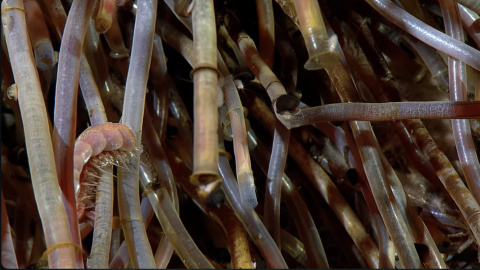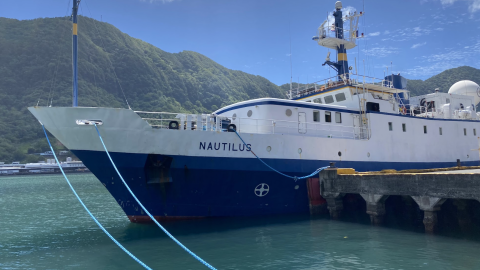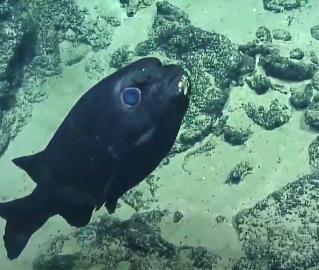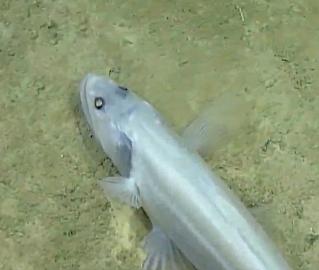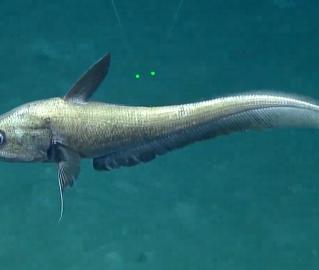Meet Ocean Explorer Jaden Crute
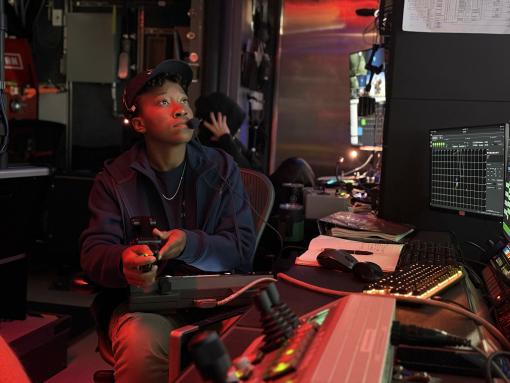
OET proudly welcomes Jaden Crute to the Corps of Exploration as part of the Science & Engineering Internship Program. This internship program supports community college, undergraduate, and graduate students in building professional workforce experience and exploring STEAM-related careers that connect to research themes like robotics, ocean science, education, and exploration. Jaden joins E/V Nautilus for our NA167 and NA168 expeditions as an ROV engineering intern.
We sat with Jaden to learn more about their experience at sea and the path that led them to Nautilus.
Describe your role with OET.
My role with OET is to work as an ROV Engineering Intern onboard the Lebuu's Voyage Cruises 1 & 2 in Palau. More specifically, I work on ROV's Hercules and Atalanta during dives and during the time in between. During dives, I co-pilot for the Hercules pilot by controlling the depth of ROV Atalanta by paying in and out of a winch that Atalanta is attached to. When Hercules and Atalanta are in the water, Atalanta's role is to take the heave of the ship so that Herc can freely and smoothly get footage of the ocean's depths. So, by controlling the depth, we're allowing Herc to move around on the end of the tether that connects the two ROVs I also control the "eye in the sky" camera view of Hercules, which can often be seen in the Nautilus live streams. I can occasionally be seen piloting Hercules and controlling the Kraft hydraulic arm as well. Outside of dives, I help the rest of the ROV team complete general maintenance, pre/post dive inspections, and repairs on both ROVs.
Can you tell us a little about your background? What influenced you as a child?
My background is in Mechanical Engineering, and I just graduated with my bachelor's degree in the spring of 2024. Now, I'm taking a gap year while searching around for graduate school programs in Ocean Engineering/Robotics. Outside of Nautilus, I work for the University of South Florida's Center for Ocean Mapping & Innovative Technologies in St. Petersburg, FL, as a surface vehicle technician and mechanical engineer. My role there began as an internship during my undergrad, and once I graduated, I decided to stay until I left for grad school. Ever since I was a child, I've had this deep desire to gain as much knowledge as possible and use that knowledge to benefit the world at large. This was my biggest point of influence, and it still is. So now, getting into ocean engineering and exploration, I feel like kid me would be really excited and proud of where we ended up.
When you were a kid, what did you want to be when you grew up?
I've known since I was around six years old that I wanted to work in robotics as an engineer, and that's mostly due to my mom. She was very avid about me getting to have extra-curricular activities, and one of the activities she signed me up for was a children's robotics class. I loved those classes so much and the rest of my life has been trying to figure out what kind of robots I wanted to work on and how to get there. I had other interests, like marine biology and photography, but I've never really wanted to do anything outside of STEM as a career.
What would you consider to be your greatest challenge entering this field?
My greatest challenge in entering this field is the fact that my undergrad didn't give me much hands-on experience. Even things as simple as how to use a drill press properly or tie down machinery with ratcheting straps are things that I've had to learn during internship experiences like this one with OET. So, trying to find positions where my employers are willing to teach me the skills that they want to see is difficult. I am a hard worker and a fast learner, but most of what employers look at first is your skill set. And that's why this internship with OET is so amazing. They know I don't have much experience with Ocean Engineering and that's kind of the point. They want you to come in, ask questions, and soak up all the information you can because they want to pass on the passion for the oceans that is so important to OET's mission. I've learned so much during this internship already that I'll carry with me forever.
Do you have any advice for someone looking to follow a similar path?
Don't be discouraged by hang-ups along the way; determination is what will get you through. If you're struggling through classes thinking it's a sign to give up on engineering or you don't know if the traditional educational route is the path for you, there is always someone out there who went through a similar dilemma and made it through to exactly where they wanted to be. There are so many routes to be an ROV engineer or pilot; you don't have to do exactly what someone else did. The same thing won't work for everyone. Get out there, try things out, and get internships if possible. If you try something that doesn't work out, that's ok. Failure is a part of life and especially a part of being a great engineer. What matters is what you do with the failure. Figure out what went wrong or what you didn't like about the experience and adjust from there.
What's next for your ocean studies and career?
The next step for me is finding graduate school programs that interest me. I really want to continue working with ROVs and get more into designing them in addition to piloting them. So, in the past few months since graduating, I have been looking for researchers who are researching what I want to do. More specifically, the applications of soft robotics and biomimetics to subsea vehicle design. I want to design vehicles like ROVs Hercules and Atalanta that are built in a way that works as efficiently and gently as possible in the environments they explore.
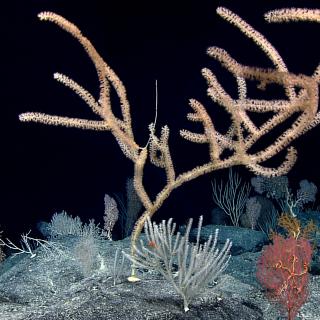
Lebuu's Voyage I - Palau
Palau National Marine Sanctuary (PNMS) –protection secured by Euotelel a Klingil a Debel Belau– is one of the most ambitious conservation efforts on Earth. Despite being rich in natural and cultural resources, there is very little data available from deep ocean habitats protected within PNMS. Working closely with the Palau International Coral Reef Center (PICRC), NOAA Ocean Exploration, and other Palauan and U.S.
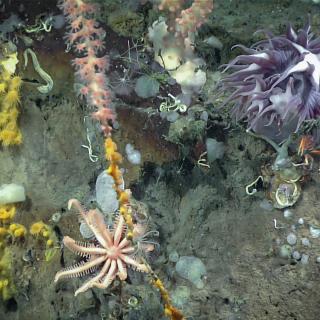
Lebuu's Voyage II - Palau
Building on the progress in the first expedition, this 11-day expedition will continue exploring Palau National Marine Sanctuary (PNMS) to understand seafloor features and the biodiversity that call deep sea habitats around Palau home. Specific cruise objectives will continue to be refined as we work with community and scientific partners.
